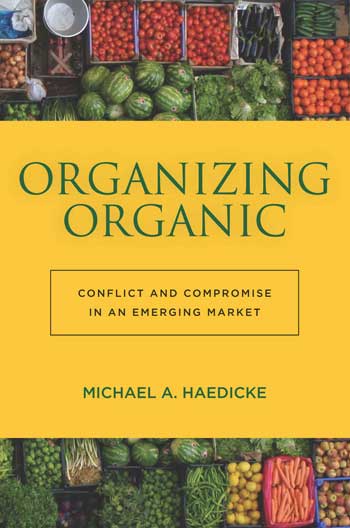
Organic farming is inspired by visions of harmony between human beings and the natural world. These days, however, many people who reflect about organic foods think instead of struggle.
Activists and scholarly observers have pointed out that food conglomerates and mass-market retailers are hungry for a slice of the organic market. Mega-farms growing acres of irrigated organic tomatoes in the Mexican desert (no one’s idea of sustainability) have made national news headlines. In his 2006 bestseller The Omnivore’s Dilemma, writer Michael Pollan questioned whether these growing numbers of market-oriented farmers and large food corporations have “cost organic its soul.”
In the rush to the barricades, few people have paused to explore the different ways that participants in the organic sector interpret the goal of farming in harmony with the natural world. My book focuses squarely on these diverse cultural understandings of organic foods and agriculture.
I show that conflicts within the organic sector often take shape around competing visions of sustainability, each of which lays claim to a mantle of moral virtue. Rather than following the well-worn cultural trope of struggle between God and mammon, these conflicts pit against one another the two warring gods of idealism and pragmatism.
At the book’s heart lies an analysis of two cultural visions of organic agriculture. The first of these visions, which I label transformative, positions organic agriculture as an alternative system of food production characterized by small-scale farms, community-based businesses, and egalitarian social relationships. Farming organically, in this vision, involves commitment to wide-ranging social and cultural change.
The second vision, which I label expansionary, identifies organic instead as a collection of environmentally-benign agricultural techniques and methodologies. From this perspective, the market-driven growth of the organic sector is a good thing, because it causes more land to be managed organically. More organic land, in turn, means reduced human impacts on the environment.
Using unique archival documents and extensive interviews with leaders in the organic sector, my book traces the development of these two visions at key moments in the organic sector’s history. I describe conditions under which the contradictions between these visions have fueled social conflict, but this is not the whole story.
I also show myriad ways – ranging from the design of national regulatory policies to the micro-politics of independent organic retail stores – in which organic sector members have created compromises between these two visions. Although they appear less dramatic than conflicts, the character of these compromises has set the course for the organic sector’s long-term development.
C. Wright Mills argued that sociological research often springs from the intersection of personal biography and history. My book is no exception.
I come from a family that bought organic foods before they were cool. I remember trips to a tiny neighborhood organic foods co-op retailer in the late 1980s. We would finger misshapen (but organically grown) vegetables and help ourselves to nuts and dried fruit from bulk bins. For us, shopping organic was part of an upper middle class, slightly Bohemian lifestyle that also involved alternative education, progressive politics, and skepticism of all things mainstream.
I also remember experiencing changes in the organic foods market that took place a few years later. While in high school in the early 1990s, I lived in a community that hosted one of a new breed of grocery stores known as “supernaturals.” Bread & Circus (a forerunner of Whole Foods Market) combined the size and inventory of a supermarket with an emphasis on natural, organic, and gourmet foods. Shopping at this store was less of a chore, more of an experience, and it offered a diffuse glow of environmental virtue to accompany its premium product prices.
Fast forward a decade, and my graduate training in organizational and cultural sociology coincided with federal regulation of organic farming and the organic trade. My attention was caught by the quixotic efforts of Arthur Harvey, an organic blueberry farmer who sued the U.S. Department of Agriculture over these regulations, but it was my scholarly goals that sparked my professional interest in this topic. I wanted to study how environmental concerns and beliefs can shape the development of new markets, and the organic sector seemed like a good place to do this.
My book situates its study of the organic sector in the context of two broad sociological ideas. The first of these concerns what are known as “institutional logics.” Sociologists who study markets and other organizational sectors have become increasingly aware that people in these social settings may have very different ideas about the nature and purpose of their activities. This is because these settings may possess competing cultural templates (or logics) for organizing their members. Is book publishing an art or a business? Is medical training about learning to care for patients or about learning the science of disease? Does organic farming seek social transformation or the diffusion of new techniques?
The institutional logics perspective is useful, but its Achilles heel is its lack of attention to the details of human behavior. I use a second sociological idea, that of “strategic action fields,” in order to connect broad cultural logics to the things that people in the organic sector actually do. This idea focuses attention on the alliances, interpretations, and struggles that people engage in as they navigate a shared social environment.
In the organic sector, the rival logics of transformation and expansion constitute cultural resources that people use to construct strategies of action and to understand the world in which they operate. In turn, their actions may affect the relative influence of the different logics over time. Thus, by blending the two sociological ideas, my book offers a framework for understanding “logics in action” in the organic sector and in other social environments.
A unique and compelling feature of my book is its use of interviews and archival documents to explore how people understand organic foods and farming in very different ways. The book opens by comparing speeches from the early 2000s by two organic sector leaders.
The first speaker, a farmer named Elizabeth Henderson offers a “radical” vision of organic agriculture to a collection of farmers and food activists in gritty La Crosse, Wisconsin. She calls for an organic sector that is “democratic and participatory,” where production is organized around regional food systems, and where small farmers can stand up to agribusiness corporations.
The second speaker, a business consultant named Joe Smillie, characterizes organic farming as “an agricultural methodology.” Speaking to an audience at an organic foods trade show in a high-tech California convention center, he calls for measures that would make it possible for all farmers to switch to organic production. Only a broad, market-oriented organic sector can stop what he describes as “the poisoning of the planet” by synthetic agricultural pesticides and fertilizers.
The point is not that one of these speakers is right and the other one is wrong. The point is that they both offer heartfelt, compelling, but ultimately incompatible visions of what organic farming can and should be. The core chapters of the book analyze how advocates of organic agriculture have wrestled with these incompatible visions at pivotal points in the sector’s history. They also consider how relationships between these visions are playing out in different segments of the sector in the present day.
A reader who opens the book to the first chapter, “Breaking Ground for a New Agriculture,” will learn about how the fragmented character of the early organic foods industry enabled these visions to coexist with a minimum of friction, at least until the emergence of a national market for organic products in the 1980s. The second chapter, “Stabilizing the Market, Dividing the Field,” shows how efforts to smooth the development of this market through federal organic regulations led to a series of disruptive conflicts, despite the intentions of nearly all the participants involved.
A reader who opens the book at a later point may find herself taken into the world of organic foods co-op stores in the chapter “Caught in the Middle.” Co-ops trace their histories to the counterculture of the 1970s, when they sought to put ideas about social and cultural transformation into everyday practice. But today, co-ops find themselves competing closely with savvy organic foods superstores like Whole Foods Market, and even with discount retailers who sell organic foods, like Wal-Mart.
Co-op managers experience agonizing tensions between adherence to a transformative ethical vision and simple economic survival. Yet, they also describe ways in which their stores have managed to combine the warring gods of efficiency and social change. As they explain these strategies, co-op leaders and others in the book emerge as thoughtful and passionate individuals who struggle to act with integrity in a complex cultural and organizational environment.
The story about the organic sector that I tell in this book is neither a triumph nor (as is the case with many other published accounts) a tragedy. It is a story of ongoing negotiations, of emerging patterns of conflict, of new approaches to compromise.
This is a good thing. The tension between transformative and expansionary visions of organic agriculture has propelled creativity and innovation within the organic sector, as well as provoking members of the sector to think more deeply about the significance of their work than they otherwise might.
However, one finding that emerged clearly in my research is that expansionary understandings of organic farming are becoming more influential, while transformative ones have retreated towards the sector’s margins. I document several reasons for this.
The federal organic regulations that went into effect in 2002 emphasized the goal of market growth and employed rationalized definitions of organic farming that left little room for discussions of systemic change. The new generation of organic foods professionals, who often work for large food companies and possess mainstream business training, find expansionary understandings more intuitively acceptable. Some small-scale farmers have chosen to exit the organic sector and to create new ways of marketing their products that go “beyond organic.”
There are real benefits to expanding the organic market in ways that convert increasing amounts of land to organic management. But there are also risks associated with the dominance of expansionary understandings. For one thing, temptations exist to alter organic farming and trade regulations in ways that would subordinate the best environmental practices to the goal of market growth. Additionally, processes of deliberation and compromise-building may be sidelined in a competitive and expanding market.
In the final analysis, people in the organic sector face an ongoing challenge, albeit in new circumstances: how can they cultivate institutions and practices that enable different ways of understanding the organic project to coexist? It is around this puzzle that some of the most exciting innovations – from participatory guarantee certification programs to new animal welfare standards – are emerging.


Michael A. Haedicke is an associate professor of sociology at Drake University in Des Moines, Iowa. Trained as a sociologist of culture and organizations, his scholarship examines how environmental activism and campaigns for social justice impact food regulation and spur entrepreneurship in the food industry. Besides Organizing Organic , featured on Rorotoko, he is the author of a number of articles on religious food certifications, natural foods co-ops, and the practice of food democracy. In 2015, he launched a research project on environmental governance on the front lines of climate change, with a focus on the politics of coastal management in southeastern Louisiana.